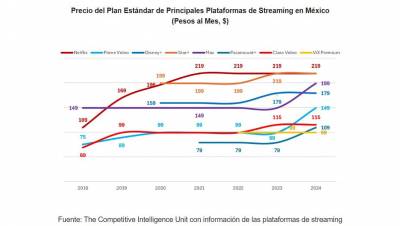To inform, entertain and advertise, digital signage systems are becoming important around the world. Although the use of this technology has always been associated with markets such as the United States and Europe, China currently has the first place.
by Julián Arcila
Day after day human beings are exposed to a growing number of messages of various characteristics. Being most of them commercial, the rise of this informative modality is due to the evolution of multimedia technologies, including the use of screens (LCD, plasma or conventional CRT) for the distribution of varied content in a modality that is known worldwide as digital signage.
There are many establishments that resort to this type of channel, but among the main ones it is worth mentioning airports, hospitals and retail chains, although in the United States it is increasingly common to see screens installed in service stations for advertising purposes or in gyms and hotels for information purposes.
In addition to LCDs, plasma and CRT (Cathode Ray Tube) monitors there is another digital signage alternative and that is known as LED screens. These are recommended for outdoor and large applications such as 5 X 5 meter screens.
If you compare this method with the traditional ones, the first one will find several advantages mainly in regards to the possibility of content changes without much effort, in addition to the ability they have to include dynamic content such as images and animations of wide variety. When it comes to its use for advertising purposes, for analysts digital signage offers a return on investment superior to traditional print media.
Technological criteria
The concept of digital signage is quite broad and includes everything from electronic mobile message boards to LCD and plasma screens, through projection screens and even organic LED screens, which can be controlled using computers or other devices. A very pertinent question is what would be the best technology, fundamentally comparing LCD and Plasma screens, which are the most colorful media today.
At this point in the article it is important to introduce the comments of four industry experts: Juan Carlos Chávez (regional manager for Latin America of Nec Displays) Walter Schoenleber (Sony), Gabriel Ruschelsman (Senior Sales Manager of Sharp, in the LCD and digital products divisions) and Anthony Uhrick (Vice President of Sales and Marketing of NextWindow).
Opinions are divided, but everything seems to indicate that LCDs are consolidating in the market of digital signage applications. Although the professionals consulted agree that Plasma technology is more appropriate for the distribution of messages with high dynamism, LCDs are the leaders for applications with enough text and static images; this could suggest that the choice of one technology or another should be made according to the use that will be given to the screens.
"Both technologies are good and valid for any digital signage application; both the user and the provider must study the content, because if the information to be presented are commercial ads in video, it is possible to think of plasma, while if the content is composed of static images it is more advisable to use LCD, "said Chávez.
Now, with regard to technical characteristics, professionals agree that LCDs have an advantage over plasma screens for several reasons, which may include lower energy consumption, lower heat transfer, low reflection index in ambient light, as well as a large visual angle, as stated by Schoenleber, Ruschelsman and Uhrick.
Moving on to content programming and exposure, both actions can be controlled by a wide range of options, from independent media players (not networked) that can present basic MPEG-2 video loops, to complex projection networks from N-Tier architectures, which are characterized by the location of computer systems being fully configurable, in other words, they allow you to control multiple screens in different spaces from a single location.
{mospagebreak}
Opportunities in Latin America
The technology of digital signage through screens is living one of its most spectacular moments in terms of Latin America and in general to any region of the world. Factors such as the fall in the prices of plasma and LCD solutions, as well as an increasingly constant development of the Internet have made the demand grow, making it easier for advertising and information to enter a new stage. AVI Latin America consulted experts about the possibilities they see on this side of the world.
One of the characteristic elements of developed markets is the relationship that is built between user and supplier when the latter is able to give advice detached from the particular interest, orienting itself towards the real satisfaction of the needs of its client. This is precisely what many of the major AV technology manufacturers are trying to generate in Latin America, a region that has traditionally been quite tropical when it comes to offering services and warranties.
For Chávez, from NEC, in Latin America there is a need for suppliers that offer advice and complete solutions. Nowadays, the user focuses 100% on the type of screen (LED/Plasma/LCD), instead of analyzing other topics that are even more important such as the type of content, type of transmission and realization of updates, among others. "This reflects the fact that there is no comprehensive advice (...) The end user must be advised; suppliers must attend courses and be updated on the different possible solutions," he said.
Ruschelsman, for his part, explained that demand in Latin America is being driven by businesses such as shopping malls, hotels, banking institutions and sports venues.
An ever closer future
It is important to note that the area of digital signage involves three different areas, namely: development of visual content, transmission of content and deployment of it, which is the theme that summons us on this occasion. However, each area has its trends and advances.
In the area of screens, trends for the future are leaning towards the development of screens with greater size and durability, according to Chávez.
In Ruschelsman's view, the industry's efforts will focus on the development and supply of higher resolution and size units, with both horizontal and vertical information presentation possibilities.
For Uhrick, the future lies in the migration from dynamic signaling to interactivity, which offers advantages over purely signaling applications. "Interactivity allows content to be adaptive to the user, as well as offers the ability to change content through customer input while providing a measurement tool to evaluate the effectiveness of a campaign (...) By making the content interactive, the message will not only be well perceived by an audience but will also serve to let advertisers know which space or establishment is most attractive to viewers," he said.
Sony's Schoenleber agreed with this, stating that digital signage will evolve to a point where customers can interact with content and respond to different offers. "This means that not only will they be able to manipulate a message, but their activity will be tracked or measured for the analysis of marketers to determine what content and position, among other aspects, works."
He complemented by saying that the ability to download content on smart cards opens up many possibilities for marketing in the sense that customer acceptance of a coupon can be detected; this way the advertiser will know what has been effective and what has not. Additionally, advertisers will have the possibility to direct the contents in a way that can directly affect the activity of their customers based on inventories, price movements, schedules and other elements that will determine the degree of return on investment.
We then have a fairly dynamic and positive environment for display systems for digital signage. The important thing will always be that the customer is aware of what the current use of the system is and what the future will be, so that in this way you can compare it with the purchasing and operating cost of it.
Finally, an element that should never be forgotten is that the missing link in many of the digital signage applications is the creativity of the content. This new information modality offers the opportunity to provide dynamic, exciting and captivating content, giving people a reason to stop long enough to receive a message.
"With an entire generation raised amidst instant messaging, on-demand videos and even the Ipod, the attention span shrinks every day. Marketing campaigns need to be updated more frequently and creativity is a fundamental element to attract consumers," said Uhrick.
























Leave your comment